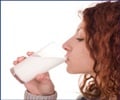Does dairy milk increase breast cancer risk? Drink just one glass of milk a day can put you at a higher risk of developing breast cancer, reveals a new study.
- Dairy milk can increase breast cancer risk
- Women who drink as little as one cup of milk per day may increase the rate of breast cancer up to 50%
- Switching from dairy milk to soy milk can keep breast cancer at bay
Read More..
First author of the paper, Gary E. Fraser, MBChB, PhD, said the observational study gives "fairly strong evidence that either dairy milk or some other factor closely related to drinking dairy milk is a cause of breast cancer in women.”
"Consuming as little as 1/4 to 1/3 cup of dairy milk per day was associated with an increased risk of breast cancer of 30%," Fraser said. "By drinking up to one cup per day, the associated risk went up to 50%, and for those drinking two to three cups per day, the risk increased further to 70% to 80%."
Current U.S. Dietary guidelines recommend three cups of milk per day. "Evidence from this study suggests that people should view that recommendation with caution," Fraser said.
Dietary intakes of nearly 53,000 North American women were evaluated for the study, all of whom were initially free of cancer and were followed for nearly eight years. Dietary intakes were estimated from food frequency questionnaires (FFQ), also repeated 24 hour recalls, and a baseline questionnaire had questions about demographics, family history of breast cancer, physical activity, alcohol consumption, hormonal and other medication use, breast cancer screening, and reproductive and gynecological history.
"However," he said, "dairy foods, especially milk, were associated with increased risk, and the data predicted a marked reduction in risk associated with substituting soymilk for dairy milk. This raises the possibility that dairy-alternate milks may be an optimal choice."
Fraser said the possible reasons for these associations between breast cancer and dairy milk may be the sex hormone content of dairy milk, as the cows are of course lactating, and often about 75% of the dairy herd is pregnant. Breast cancer in women is a hormone-responsive cancer. Further, intake of dairy and other animal proteins in some reports is also associated with higher blood levels of a hormone, insulin-like growth factor-1 (IGF-1), which is thought to promote certain cancers.
"Dairy milk does have some positive nutritional qualities," Fraser said, "but these need to be balanced against other possible, less helpful effects. This work suggests the urgent need for further research."
Reference:
- Dairy, soy, and risk of breast cancer: those confounded milks - (https://doi.org/10.1093/ije/dyaa007)
Source-Eurekalert
















